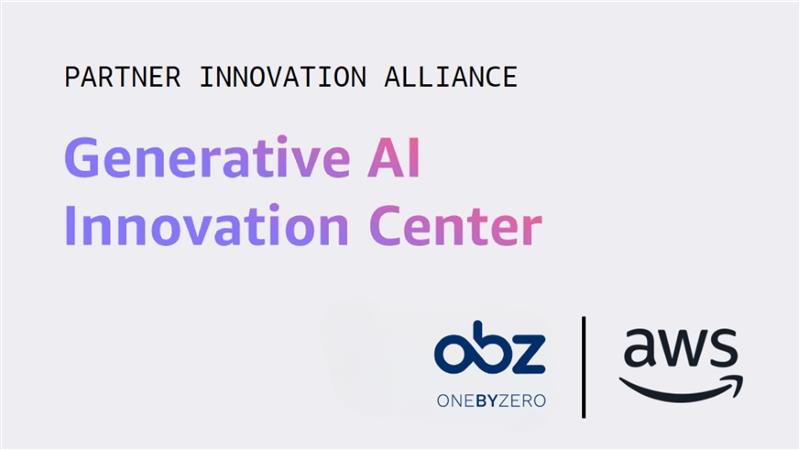
Overview

Traditional ETL modernization requires extensive manual coding and validation, consuming up to 60% of total migration effort and often resulting in project delays, budget overruns, and inconsistent outcomes. ETL Crew eliminates this dependency through a multi-agent AI architecture that functions like a virtual migration team. Each AI agent is specialized for a distinct role - analyzing business logic, generating optimized ETL code, and validating transformation accuracy - ensuring end-to-end automation and quality assurance throughout the migration lifecycle.
Developed by OneByZero, an AWS Generative AI Innovation Center (GenAIIC) Partner Innovation Alliance (PIA) member, in collaboration with the GenAIIC’s Partner Agent Factory (PAF), ETL Crew leverages deep technical insights and reusable assets from GenAIIC, including foundational components of the Agent Core Runtime, Strands SDK, and multi-agent orchestration patterns on Amazon Bedrock.
This collaboration played a pivotal role in shaping ETL Crew’s scalable, reliable, and enterprise-grade architecture for AI-powered ETL modernization - combining OneByZero’s domain expertise with AWS Generative AI Innovation Center’s frameworks to deliver faster, compliant, and cost-efficient modernization at scale by offloading repetitive migration tasks to intelligent agents, ETL Crew transforms ETL modernization from a slow, manual engineering task into an automated, repeatable, and scalable process - delivering up to 50% faster migrations, significant cost savings, and consistent quality across large enterprise workloads.
Core Capabilities Automated Intelligence: AI-powered agents automate complex ETL transformations, significantly reducing manual effort and human error. End-to-End Automation: Covers the complete ETL modernization journey - from requirement interpretation and legacy code extraction to transformation, validation, and deployment. Legacy System Compatibility: Supports a wide range of legacy ETL technologies including SQL, DataStage, Python, and Scala, intelligently mapping dependencies and transformation logic. Code Generation & Validation: Generates cloud-optimized ETL code aligned with AWS-native frameworks, followed by comprehensive automated testing to ensure performance and compliance. Execution & Monitoring: Offers real-time migration visibility with continuous updates and execution tracking via enterprise collaboration platforms such as Slack or Teams. Business Impact
ETL Crew transforms ETL modernization from a slow, manual engineering task into an automated, repeatable, and scalable process - delivering: Up to 50% faster migrations, enabling earlier access to cloud and AI capabilities. Substantial cost savings through reduced manual effort, minimized rework, and compressed project timelines. Improved reliability and compliance via AI-driven validation and consistent code generation. Risk mitigation by reducing migration failure rates and dependency on scarce ETL engineering expertise. By offloading repetitive migration tasks to intelligent agents, ETL Crew frees skilled engineering teams to focus on innovation, analytics, and business value creation rather than maintenance-heavy transformation work.
Highlights
- Generative AI–Driven Modernization-Transforms legacy ETL logic into cloud-native architectures using a team of intelligent AI agents that automate analysis, code generation, and validation.
- End-to-End Automation on AWS- Delivers a fully automated modernization lifecycle - from requirement interpretation to deployment - seamlessly integrated with AWS Glue, Lambda, and SageMaker.
- Accelerated, Accurate, and Scalable- Reduces migration timelines by up to 50%, cuts costs by up to 3x, and ensures consistent, high-quality ETL modernization across large enterprise workloads.
Details
Introducing multi-product solutions
You can now purchase comprehensive solutions tailored to use cases and industries.

Pricing
Custom pricing options
How can we make this page better?

Legal
Content disclaimer
Support
Vendor support
For product support, please contact us at helpdesk@onebyzero.ai . We offer structured support with prioritized incident handling:
-
Priority 1 (Critical): Major service outage or critical business impact requiring immediate attention.
-
Priority 2 (High): Significant functionality is impaired, but operations continue in a limited capacity.
-
Priority 3 (Medium): Non-critical issue with limited impact on business operations.
-
Priority 4 (Low): General queries, enhancements, or cosmetic issues with no immediate impact.
Our team is available during business hours and provides 24x7 support for high-priority incidents. Enterprise SLAs and escalation paths are available on request.